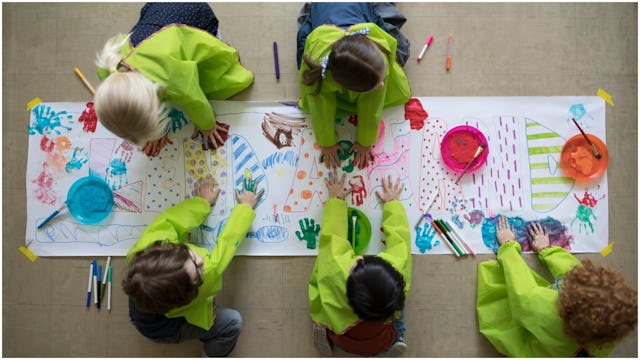Research Shows The Arts Have Profound Impact On Kids' Education

Important new research shows just how important arts education is for kids
Glee had it right all along. A new study found that arts education has a significantly positive impact on children’s lives. Kids who engage in the arts – whether it’s dance, theatre, or visual mediums – will be more likely to show compassion for others, less likely to have disciplinary problems, and will perform better on writing tests.
Those are pretty incredible results, which makes it all the more disappointing that arts programs continue to decline in schools.
Researchers selected 10,548 students who were enrolled in 42 schools across the Houston area for this study. The choice of that particular area was significant – almost a third of elementary and middle school students in the district don’t have a full-time arts teacher.
The study compared schools with eight “school-community arts partnerships” to schools with just three programs. Students selected for those extra arts programs were provided with everything from fields trips to interactions with artists-in-residence. One group of first-graders from Codwell Elementary were given a puppet show performance, which featured an anti-bullying message. “You felt like you were in that story,” Shelea Bennett, the group’s teacher, said, per KQED. “By the end of the story they were able to answer why [bullying] wasn’t good, and why you shouldn’t act this way.”
The study then compared the group of students who were provided with additional arts education to the group of students who weren’t.
Researchers looked at the children’s academic performances, their discipline, and their answers to a survey, which included questions like, “I want to help people who get treated badly” and “I plan to go to college.”
The study found that the group of students who were given extra arts education behaved better, with disciplinary infractions dropping 3.6 percentage points. They also had higher writing test scores and demonstrated more compassion in their survey answers. There was no difference in the children’s math scores but Brian Kisida, one of the researchers, explained that that shouldn’t take away from the importance of the study.
“It could have come out negative. It could have been, look, they did this extra stuff where they learned more in these other domains but their math scores went down, so here’s the tradeoff,” Kisida said. “We don’t see evidence of a tradeoff.”
The arts can also have a significant impact on children who are struggling in their classes. “Some students who don’t excel academically, they’re more engaged, because it gives them a different way to learn,” Tiffany Thompson, a first-grade teacher at Codwell Elementary, told KQED.
Unfortunately, arts programs continue to be slashed. In 2017, the Detroit Free Press reported that 40% of schools in the city didn’t have music or arts classes. “It’s been a tragic situation that kids were not exposed to that opportunity to take and study the arts,” Willie McAlister, head of the district’s office of fine arts, said.
Oklahoma faces a similar problem. According to a 2017-2018 report from The Oklahoma Policy Institute, there were 1,110 fewer art and music classes than four years ago. Also, 28% of students in the state are not receiving an arts education at all.
Here’s hoping that this study helps further reinforce the importance of arts programming in schools. The stats really don’t lie.